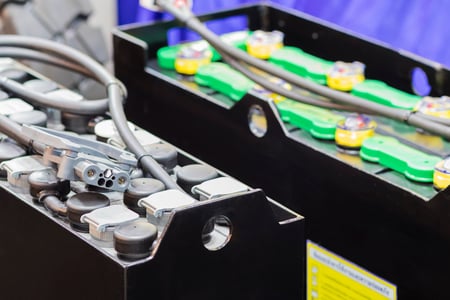 There has been a lot of talk lately about lead acid being 99% recyclable. It is a true claim. But at the same time, manufacturers and distributors like you are highly inquisitive about emerging technology like lithium, thin plate pure lead and fuel cells. Why? If the move from lead acid isn’t to become more environmentally sustainable, why are so many people looking elsewhere?
There has been a lot of talk lately about lead acid being 99% recyclable. It is a true claim. But at the same time, manufacturers and distributors like you are highly inquisitive about emerging technology like lithium, thin plate pure lead and fuel cells. Why? If the move from lead acid isn’t to become more environmentally sustainable, why are so many people looking elsewhere?
Here are a few possibilities:
1. Their fleet has too many batteries (which has the additional disadvantage of big battery rooms).
2. Their high usage (3000+ hours a year per forklift) means that they have to run a battery room.
3. Even with only one battery per truck, operators aren’t plugging up.
4. Watering batteries correctly is HARD! It takes a disciplined process to do it at the right time and not the convenient time.
5. They are sick of lead acid dripping on the floor! That doesn’t make a lead acid battery feel environmentally friendly.
6. They have experienced or heard horror stories of fast charging eating up their batteries in three years or less.
7. If they run AGVs but didn’t set up the charging system properly, their AGM batteries lasted less than half the expected lifespan.
8. Swapping batteries is a safety hazard and drives down labor productivity.
9. Poorly maintained batteries run at lower voltage; drops in voltage can damage a forklift’s electronics if the forklift’s “BDI” isn’t set properly.
10. Batteries don’t make it through a shift, consistently running out of power during peak periods or at odd times.
All of these reasons can be boiled down and assigned to three overarching categories:
1. Reducing the number of power assets and eliminating battery swapping
2. A hatred for watering batteries coupled with the wish for a “cleaner” option.
3. The desire for surety of uptime, cost and safety (aka you’re tired of failure at ill-defined and unpredictable time periods).
What you may not realize is that at least half – if not more – of the issues mentioned above are operational in nature and not necessarily technology-oriented.
What does that mean? You’ll need to consider a few things to be sure your house in order, because otherwise, switching technology may not magically solve your existing issues. For example:
-
Who is helping you map your material handling processes?
-
Who is responsible for changing operator behavior for charging or swapping or watering as needed?
-
Who has clear ownership for battery and charger performance for the long term? If it fails, did you give one person or party full accountability and ownership to deliver it for you? Power is almost half the hard cost and a much bigger portion of your downtime risk, so not having accountability for this might be a missing link in your supply chain strategy!
Finally, manufacturers are trying to address these issues with new technology. At Concentric, we love new technology! That said, we’ve been addressing these challenges with unique lead acid solutions for nearly 20 years through GuaranteedPOWER®.
But it’s not just about the product, it’s about assessing, designing and managing the system over the long haul. That’s why we give customers the opportunity to test these technologies on both small and large scales right next to their lead acid fleet via GuaranteedPOWER® solutions. That may teach you all you need to learn.
A final question to consider: do you want to become an expert on new battery technology for forklifts, and do you want to manage those new technologies long term, or do you just want them to run?!


 Ryan Lynch
Ryan Lynch

